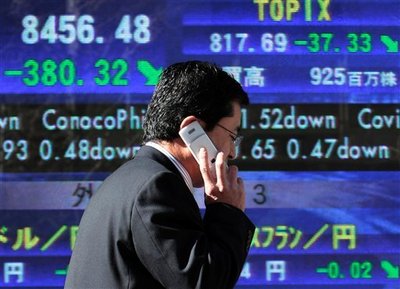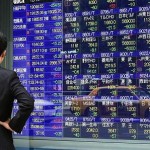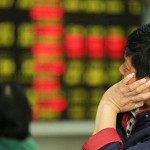Asia markets close lower, Nikkei 225 slips 2.71%

Asia’s major markets closed mostly lower, with investor sentiment in the region remaining fragile as oil prices continued to slide and China concerns weighed.
The Australian market erased its morning gains to slip into negative territory, with the main ASX 200 closing down 7.13 points, or 0.14 percent, at 4,925. The energy and materials sectors weighed throughout the session, finishing down 3.51 and 2.31 percent respectively on the back of lower oil and commodity prices. On Monday, the ASX 200 had dropped 1.16 percent.
In Japan, where markets resumed trading today after a day off Monday, the Nikkei 225 finished 479 points, or 2.71 percent, lower at 17,218.96, with the mining sector down 5.55 percent and the oil and coal sector falling 5.21 percent. In South Korea, the Kospi closed down 3.98 points, or 0.21 percent, at 1,890.86.
Chinese markets wavered between positive and negative territory, a day after taking a sharp plunge.
The Shanghai composite was up 0.13 percent after rising as much as 0.9 percent and falling as much as 0.71 percent in the first 10 minutes of trade. On Monday, a late-afternoon sell-off saw the index fall more than 5 percent.
The smaller Shenzhen composite was up 0.686 percent after earlier falling as much as 1.45 percent. The CSI300 was up 0.83 percent. Away from the mainland, Hong Kong’s Hang Seng index erased gains to slip 0.38 percent.
Before trade opened, the People’s Bank of China (PBOC) set the yuan mid-point fix at 6.5628 against the dollar, similar to Monday’s fix of 6.5626. The dollar-yuan pair traded 0.07 percent higher at 6.5724.
Lucy MacDonald, chief investment officer for global equities at Allianz Global Investors, told CNBC’s “Asia Squawk Box” that current market volatility was to be expected, given two large, unexpected events that have happened recently.
“One was the oil price doing what it’s done. And that still isn’t resolved,” she said. “The second thing was the Chinese currency being unpegged. That wasn’t expected either. So two very big important things happened and those are the source of all the volatility at the moment.”
Mainland financials were among the top movers on the Shanghai index, with Orient Securities up 2.96 percent, Founder Securities gaining 3.86 percent and Huatai Securities up 2.52 percent.
Hong Kong-listed shares of Dalian Wanda traded down 1.03 percent as the property and entertainment giant said it became the majority shareholder in Legendary Entertainment in Hollywood, in a deal worth $3.8 billion. Legendary Entertainment is the producer of films such as the ‘Dark Knight’ Batman series and ‘Godzilla.’
Oil futures extended declines, tapping fresh 12-year lows, after a selloff during U.S. trade.
During Asian trading hours, prices plunged further, as U.S. West Texas Intermediate (WTI) crude traded 2.45 percent lower at $30.64 a barrel. The globally traded Brent futures fell 2.69 percent to $30.70 a barrel.
Commodity plays extend losses
Energy plays across the board lagged, with shares of Santos closing down 8.1 percent, Oil Search down 4.15 percent and Woodside Petroleum seeing losses of 1.99 percent in Australia. In Japan, Inpexand Japan Petroleum closed lower, down 5.82 and 7.44 percent respectively.
Resources stocks in Australia finished the session lower, with BHP Billiton and Rio Tinto, the country’s two largest miners, down 3.47 and 3.33 percent respectively.
Iron ore miner Gindalbie Metals trimmed some losses, but still ended down 57.14 percent after reports emerged that Ansteel was reviewing their funding options for the miner. Gindalbie could face financing difficulties should Ansteel withdraw its funding.
Elsewhere, coal producer Whitehaven Coal erased morning gains to trade down 5.65 percent. Earlier, its shares surged 4.84 percent after it reported a jump in coal output and sales and confirmed its profitability in the first half of fiscal 2016.
In Japan, the dollar-yen pair traded lower at 117.50 with the yen, a safe haven currency, seeing some gains in the middle of the ongoing market turmoil. Major export-oriented stocks, which depend on the dollar-yen pair, such as Toyota, Nissan, Sony and Mitsubishi Electric, all traded down.
Sharp shares erased morning gains to trade down 1.75 percent. Earlier, shares ticked up after local reports said Japanese state-backed fund INCJ offered to invest 200 billion yen ($1.7 billion) to help bail out the electronics maker. Reuters, citing a source, said the company also plans to ask banks to convert 150 billion yen in loans into equity.
Shares of Honda trimmed gains to close flat as the Japanese carmaker introduced a newer, updated model of its Ridgeline pickup trucks at the North American International Auto Show in Detroit.
Overnight in the U.S.
Stateside, major U.S. indexes closed mixed Monday, with the Dow Jones industrial average up 52.12 points, or 0.32 percent, at 16,398.57. The S&P 500 also gained 1.64 points, or 0.09 percent, to 1,923.67, while the Nasdaq composite finished lower by 5.64 points, or 0.12 percent, at 4,637.99.
On the data front, India is set to release its November industrial production numbers as well as its December consumer price index.
Source: CNBS – Asia markets close lower, Nikkei 225 slips 2.71%





























